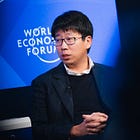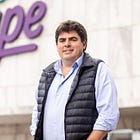This article is part of Fintech Leaders by Miguel Armaza, a newsletter with almost 70,000 builders, entrepreneurs, investors, regulators, and students of financial services. I invite you to share and sign up! Also, if you enjoy this conversation, please consider leaving a review on Apple Podcasts or Spotify so more people can learn about us.
Pedro Arnt is the CEO of dLocal (NASDAQ:DLO), a multi-billion dollar payments company that specializes in cross-border and local payments in emerging markets. Founded in Montevideo, Uruguay, dLocal today operates in 40 markets across Africa, Asia, and Latin America.
Pedro has an impressive background and you’ll learn a lot from him. Prior to his appointment as dLocal CEO, he spent 24 years at MELI and was the CFO of the company from 2011 to 2023. During his tenure as CFO, MELI had an amazing run and went from a market cap of $4 Billion to $70 Billion. Today, MELI has a market cap of over $100 billion.
In this episode, we discuss:
Lessons from the early days of MercadoLibre and launching Mercado Pago
“If the data clashes with the obvious, go with the obvious and try to figure out what's happening with the data.”
Prior to his CEO role at dLocal, Pedro had a 24-year run at MELI, where he held the CFO role for over a decade. Just to put it in perspective, MercadoLibre was founded in Aug 1999 and Pedro joined the company in November of the same year, just three months later! While MercadoLibre didn’t initially have product-market fit due to Latin America’s low internet adoption, the team validated their approach by studying successful companies like eBay and Amazon in the US, which gave them the confidence to push forward, even without a perfect local fit at first.
Optimism and grit in leadership. MercadoLibre was founded and is still led by CEO, Marcos Galperin, who’s probably up there with Musk, Bezos, and Gates, among the top entrepreneurs of our time. And although the company today has a market cap of $100B+, the early days were anything but easy. A strong dose of resilience was crucial and Pedro recalls how Marcos always maintained a delicate balance between realism and optimism. This mindset of pushing forward, even in the face of near failure, was crucial in navigating MercadoLibre through critical moments, including almost running out of cash days before their Series B.
Iterating through customer pain points. One of the most valuable lessons from Pedro’s days at MercadoLibre was their ability to respond directly to customer pain points and turn this into successful products. The creation of Mercado Pago (initially an escrow system and today a very large payments and banking system), was a direct response to trust issues in transactions. This not only solved a critical user problem, but also became the foundation for further innovations (and arguably half of the company’s market capitalization today). Mercado Pago is the perfect example on how MELI leveraged its platform to experiment and iterate new business models.
How to hire amazing people
MercadoLibre employs over 58,000 people today; dLocal has close to 1,000 employees. Needless to say, Pedro has hired a lot of people over the last three decades. What has he learned?
Structured Interviews Aren’t Enough. Work Samples & Reference Checks Are Key.
Relying solely on structured interviews is a poor way to evaluate talent. While structured interviews are a step up from unstructured ones, they still feel like a crapshoot and leave too much uncertainty about a candidate’s potential. Pedro’s research showed that work samples are more predictive of future performance than interviews. However, the single best thing you can do before hiring someone is getting insights from people who’ve worked closely with the candidate. What colleagues and former managers say about a person over a long working relationship is the most reliable predictor of success.
Redefining Reference Checks
Reference checks can often be regarded as a formality, with referees being hesitant to provide critical feedback. To change that, one has to create an environment where referees feel comfortable giving honest, candid evaluations. This involves setting the right tone early in the reference call, ensuring confidentiality, and asking structured questions about both strengths and weaknesses of the candidate.
How to build beautiful products
“You don't really know the answer to a problem, so you think it through, but you need to keep the right amount of self-doubt, because that's what pushes you to try.”
Balancing intuition with data. In order to build great tech products, it’s important to use both intuition and data in the product development process. While data is essential and everyone should be collecting and analyzing it, Pedro cautions against letting it drive decisions blindly, as noise in the data can easily mislead. Instead, product teams should use heuristics and gut instincts to guide them, especially when the data conflicts with what seems obvious. In his experience, the best products are built with a healthy balance of documented insights and strong intuitive judgment.
Embrace mistakes and iterate quickly. Building great tech products requires embracing mistakes as a natural part of the process. It’s less about avoiding errors and more about learning from them quickly. As we’ve heard from numerous guests on this show, the key is to ensure fast adaptation and course correction. Great products are often the result of a series of errors that teams were able to learn from and correct, leading to a better final outcome.
Stepping into the role of CEO as a non-founder, and avoiding Manager Mode… and a lot more!
“Focus on your customers, observe your competitors.”
Drawing from his MELI experience, Pedro is now laser-focused on building mechanisms and processes that allow for sustainable growth. His CFO background gave him insight into how to structure a company for scale, not just from zero to 10, but from 10 to 1,000 and beyond. He believes this is crucial for companies like dLocal, which grew rapidly in its first seven years and now require an "operating system" to continue compounding growth across 40+ markets.
Understanding the limits of being a non-founder CEO, Pedro recognizes there are things only a founder can do due to their unique relationship with the business and its people. Rather than trying to emulate a founder’s style, his approach is to adapting to your own strengths and being aware that certain founder-driven dynamics won’t be replicable.
Books Recommended
The Umbrella Murder by Ulrik Skotte - a 30-year investigative piece into the 1978 assassination of cold war dissident, Georgi Markov, in London.
Want more podcast episodes? Join me and follow Fintech Leaders today on Apple, Spotify, or your favorite podcast app for weekly conversations with today’s global leaders that will dominate the 21st century in fintech, business, and beyond.


























Share this post